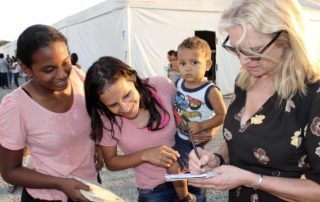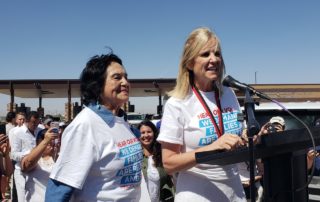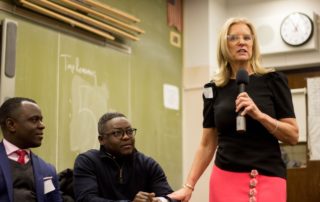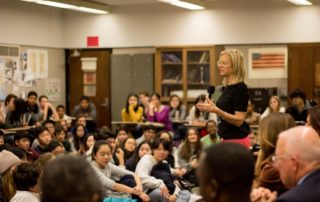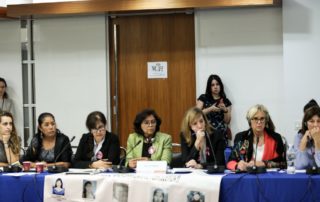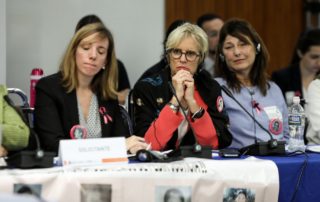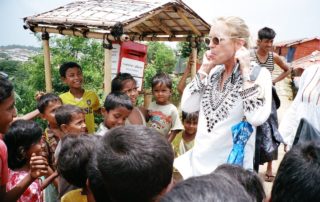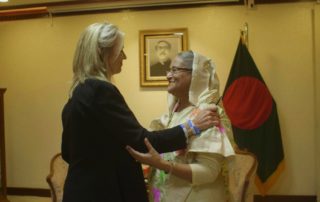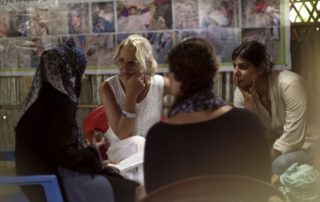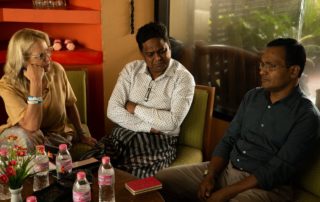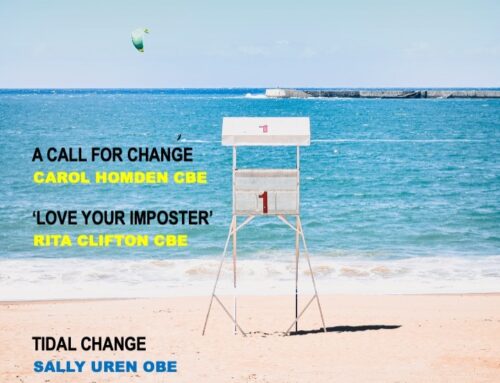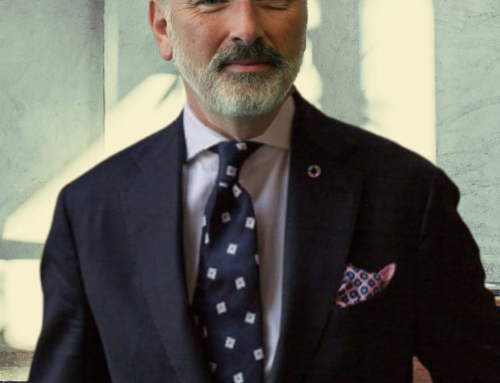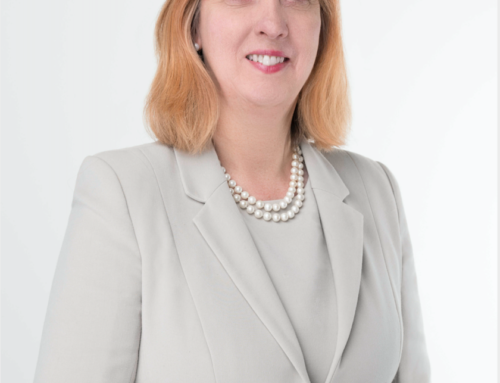Building a pandemic-free future, and a more just and peaceful world

Photo by Kevin Mazur/Getty Images for Robert F. Kennedy Human Rights
It would have been unthinkable then, how much would change in a series of moments following my February lecture at Catholic University of the Sacred Heart in Milan.
Italy would shortly be placed on lockdown, with the rest of Europe and the United States soon to follow, altering routines and shifting our focus, perhaps permanently.
Our beautiful Robert F. Kennedy Human Rights Italia office in Florence would be turned into makeshift housing for doctors and nurses. Many of my family members and friends would be stricken by COVID-19, in the midst of which an accident would claim the vibrant lives of my beloved niece Maeve and her young son.
All of this has caused me to reflect on the words of my father during another time when the world felt incredibly savage, unpredictable- and off-kilter. Speaking to the Cleveland City Club a day after the assassination of Martin Luther King Jr. in 1968, he called for us to admit “the vanity of false distinctions,” to instead find our own advancement in the search for the advancement of all.
“We must admit in ourselves that our own children’s future cannot be built on the misfortunes of others,” he said. “We can perhaps remember, if only for a time, that those who live with us are our brothers, that they share with us the same short moment of life; that they seek, as do we, nothing but the chance to live out their lives in purpose and in happiness.”
A half century later, it is imperative we take his message to heart, making sure our societal response to the ongoing Coronavirus pandemic is tethered to the same strong sense of equity for all.
After all, social justice in a time of social distancing builds a foundation not only for a pandemic-free future, but for the just and peaceful world that was his vision.
In these times, “remembering those who live with us” must include a plan to help the disproportionate number of disadvantaged students who are unable to keep up with the lesson plans made easily available to their wealthy, white peers. Amid coast-to-coast lockdown orders, virtual learning is the only option for the country’s 57 million K-12 students, but reliable internet access is often dependent on income level, studies show. Increasing efforts must be made to address all students’ needs, through careful consideration and planning by school administrators and supplemental help from philanthropic groups and human rights education programs.
It must include a plan to safeguard women around the world who face increasing threats of violence, as domestic abuse is flourishing in the close quarters called for during quarantine. With domestic violence organizations straining under increased demands, the U.N. has called for governments to step up, prioritizing the health and safety of women. Some countries, like France, have announced efforts to put up victims in hotel rooms and add counseling centers to grocery stores, but more must be done.
We must also remember those detained pretrial and in immigrant detention, who are unable to practice social distancing to prevent the spread of illness in the tinderboxes that are jail sites. At Robert F. Kennedy Human Rights, we have worked with the National Bail Fund Network in recent weeks to secure the release of more than 215 people in jails across 10 states. Jail and immigration detention should never equate to death sentences, and we hope that the current public health crisis will help us see with new eyes how these systems of mass human caging are and have always been so incredibly cruel, dangerous, violent, and unnecessary.
As governments around the world have declared states of emergency to bolster their responses to the pandemic and save lives, we must also keep a watchful eye, given the rise of authoritarianism around the world, to ensure that civic space is protected and the legitimate activity of human rights defenders is not curtailed. Government actions, such as China’s mandate that citizens carry cell phones so they can be constantly tracked, followed by Israel’s announcement that its citizens must do the same, must comply with international law mandating timeliness and sunset clauses, proportionality and nondiscrimination.
Furthermore, any efforts to address and stabilize the global food supply chain during this pandemic must make sure the most vulnerable are protected, from the 300 million children reliant on school meals around the world to the farmworkers who harvest crops, who must be guaranteed working conditions are safe, and wages are fair.
These are the areas where we see urgent need, and where we are focusing our energies as a human rights organization. But we cannot succeed alone.
International human rights law offers us a blueprint for action as we face this unprecedented crisis together, reminding us that all citizens of the world have inalienable rights—no matter of their race, gender, background, income level, or sexual orientation.
When the lockdowns end and we open our doors, we must embrace our neighbors with a renewed and refocused sense of purpose, changed perhaps forever, for the better.
“Surely this bond of common faith, this bond of common goal, can begin to teach us something,” my father said in Cleveland. “Surely we can learn, at least, to look at those around us as fellow men and surely we can begin to work a little harder to bind up the wounds among us and to become in our hearts brothers and countrymen once again.”
For the future to truly be COVID-free, the world must become a hopeful, healing and humane place for us all.
Kerry Kennedy is president of Robert F. Kennedy Human Rights
https://rfkhumanrights.org/


Building a pandemic-free future, and a more just and peaceful world

Photo by Kevin Mazur/Getty Images for Robert F. Kennedy Human Rights
It would have been unthinkable then, how much would change in a series of moments following my February lecture at Catholic University of the Sacred Heart in Milan.
Italy would shortly be placed on lockdown, with the rest of Europe and the United States soon to follow, altering routines and shifting our focus, perhaps permanently.
Our beautiful Robert F. Kennedy Human Rights Italia office in Florence would be turned into makeshift housing for doctors and nurses. Many of my family members and friends would be stricken by COVID-19, in the midst of which an accident would claim the vibrant lives of my beloved niece Maeve and her young son.
All of this has caused me to reflect on the words of my father during another time when the world felt incredibly savage, unpredictable- and off-kilter. Speaking to the Cleveland City Club a day after the assassination of Martin Luther King Jr. in 1968, he called for us to admit “the vanity of false distinctions,” to instead find our own advancement in the search for the advancement of all.
“We must admit in ourselves that our own children’s future cannot be built on the misfortunes of others,” he said. “We can perhaps remember, if only for a time, that those who live with us are our brothers, that they share with us the same short moment of life; that they seek, as do we, nothing but the chance to live out their lives in purpose and in happiness.”
A half century later, it is imperative we take his message to heart, making sure our societal response to the ongoing Coronavirus pandemic is tethered to the same strong sense of equity for all.
After all, social justice in a time of social distancing builds a foundation not only for a pandemic-free future, but for the just and peaceful world that was his vision.
In these times, “remembering those who live with us” must include a plan to help the disproportionate number of disadvantaged students who are unable to keep up with the lesson plans made easily available to their wealthy, white peers. Amid coast-to-coast lockdown orders, virtual learning is the only option for the country’s 57 million K-12 students, but reliable internet access is often dependent on income level, studies show. Increasing efforts must be made to address all students’ needs, through careful consideration and planning by school administrators and supplemental help from philanthropic groups and human rights education programs.
It must include a plan to safeguard women around the world who face increasing threats of violence, as domestic abuse is flourishing in the close quarters called for during quarantine. With domestic violence organizations straining under increased demands, the U.N. has called for governments to step up, prioritizing the health and safety of women. Some countries, like France, have announced efforts to put up victims in hotel rooms and add counseling centers to grocery stores, but more must be done.
We must also remember those detained pretrial and in immigrant detention, who are unable to practice social distancing to prevent the spread of illness in the tinderboxes that are jail sites. At Robert F. Kennedy Human Rights, we have worked with the National Bail Fund Network in recent weeks to secure the release of more than 215 people in jails across 10 states. Jail and immigration detention should never equate to death sentences, and we hope that the current public health crisis will help us see with new eyes how these systems of mass human caging are and have always been so incredibly cruel, dangerous, violent, and unnecessary.
As governments around the world have declared states of emergency to bolster their responses to the pandemic and save lives, we must also keep a watchful eye, given the rise of authoritarianism around the world, to ensure that civic space is protected and the legitimate activity of human rights defenders is not curtailed. Government actions, such as China’s mandate that citizens carry cell phones so they can be constantly tracked, followed by Israel’s announcement that its citizens must do the same, must comply with international law mandating timeliness and sunset clauses, proportionality and nondiscrimination.
Furthermore, any efforts to address and stabilize the global food supply chain during this pandemic must make sure the most vulnerable are protected, from the 300 million children reliant on school meals around the world to the farmworkers who harvest crops, who must be guaranteed working conditions are safe, and wages are fair.
These are the areas where we see urgent need, and where we are focusing our energies as a human rights organization. But we cannot succeed alone.
International human rights law offers us a blueprint for action as we face this unprecedented crisis together, reminding us that all citizens of the world have inalienable rights—no matter of their race, gender, background, income level, or sexual orientation.
When the lockdowns end and we open our doors, we must embrace our neighbors with a renewed and refocused sense of purpose, changed perhaps forever, for the better.
“Surely this bond of common faith, this bond of common goal, can begin to teach us something,” my father said in Cleveland. “Surely we can learn, at least, to look at those around us as fellow men and surely we can begin to work a little harder to bind up the wounds among us and to become in our hearts brothers and countrymen once again.”
For the future to truly be COVID-free, the world must become a hopeful, healing and humane place for us all.
Kerry Kennedy is president of Robert F. Kennedy Human Rights
https://rfkhumanrights.org/



